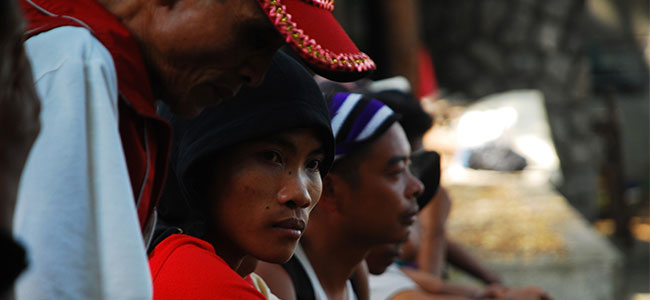By CONG B. CORRALES,
Associate Editor
(Second of four parts)
Cart before the horse
It started in Dec. 20, 1999, when the Bunawan Mining Corporation (BMC) filed an exploration permit application denominated as EXPA 00037-XIII (Bunawan EXPA) for an area located in the towns of Rosario and Bunawan in Agusan del Sur.
The areas in the towns of Rosario and Bunawan the mining firm applied to explore, however, encroached the ancestral domains of the Manobo groups: Caulishan Maligaya, Marfil, Pamintingan, Cabantao, Maputi, Masabong, Ancestral Domain Manobo Tribal Association, Inc. (Cammpacamm); and the Bunawan Tribal Council of Baes and Datus, Inc. (BTCBDI), which holds Certificate of Ancestral Domain Title (CADT) Nos. 78 and 136, respectively.
Both groups insist that the Ancestral Domains Office of NCIP 13 should have conducted the supposed field-based investigation instead of the National Commission on Indigenous Peoples (NCIP) Central Office or its Agusan del Sur office.
The tribal groups pointed out that when the NCIP Central Office conducted the field-based investigation, both the central office and its provincial office violated Section 59 of Republic Act No. 8371, the Indigenous Peoples’Rights Act of 1997, and Section 8 of NCIP Administrative Order No. 3, Series of 2012 or the Revised Guidelines of Free, Prior, and Informed Consent (FPIC).
Under the Ipra Law, the FPIC protocol is a prerequisite to any “project or activity involving exploration, development, exploitation, and utilization of natural resources within an ancestral domain.
The 1997 Indigenous Peoples Rights Act (IPRA) protects indigenous cultural communities by legalizing the right to Free, Prior and Informed Consent (FPIC) for indigenous cultural communities when private companies intend to explore natural resources and to operate in their ancestral domain. The IPRA also provides the community exercise of “priority rights” to their natural resources that formally gives indigenous cultural communities the right to harvest, extract, develop or exploit any natural resource within their ancestral domain and to choose a development partner.
The legislation of the right to determine their own form of development serves to ensure the security of indigenous cultural communities against the obvious effects of “development aggression” that could potentially lead to the loss of ancestral lands, dislocation of communities, destruction of traditional ways of life, economic impoverishment, and political marginalization (Indigenous Work Group on Indigenous Affairs n.d.). The legislation was, in effect, ensuring human security for indigenous cultural communities.
When legislation passes with the intent to protect indigenous peoples against the “outsider” companies from exploiting indigenous cultural communities, an unanticipated question for policy makers is “ what to do” with the emergence of factions within the community competing for a rivalries and excludable public good – i.e., mining rights. It highlights several components identified by the UNDP Human Development Report (United Nations 1994) as components of human security.1 while there is interrelationship between all the identified components of human security, this paper focuses on economic security, personal security and community security.1
According to the records of the Mining and Geosciences Bureau-Caraga (MGB 13), the Bunawan Mining Corporation was able to secure its endorsement as early as May 8, 2012. However, the purported field-based investigation was release only on Dec. 22, 2012.
“BMC fraudulently used the endorsement of the (indigenous peoples) of CADT 136 to secure the FPIC for the area of the (indigenous peoples) of CADT 78,” a chronology of events of the groups’ allegation reads in part.
The groups further claimed there was neither a filed-based investigation nor an FPIC conducted with the indigenes living in CADT 78.
The Indigenous Peoples’ Rights Act (IPRA) is modelled on the provisions of the UN Draft Declaration on Indigenous Peoples’ Rights. In theory IPRA is one of the most enlightened laws dealing with Indigenous Peoples, recognizing the free prior and informed consent (FPIC) of Indigenous Peoples, and asserting that in the absence of such a clear level of consent, a project cannot proceed. In practice however, this is regularly undermined, not least by legislation such as the 1995 Mining Code, which in many cases gives mining claims to the same Indigenous land supposedly covered by IPRA.1
Disclaimer
Mindanao Gold Star Daily holds the copyrights of all articles and photos in perpetuity. Any unauthorized reproduction in any platform, electronic and hardcopy, shall be liable for copyright infringement under the Intellectual Property Rights Law of the Philippines.








